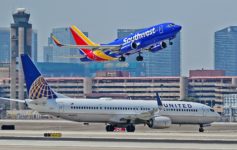
United Airlines is hardly unique having more pilots than daily passengers, but it is the first airline that has indicated how it might handle pilot job cuts once CARES Act funding dries up this autumn.
United Airlines Hints That 1/3 Of Pilots May Be Furloughed If Demand Does Not Improve
Pilots at United Airlines are hardly unique to the “more employees than daily passengers” category. United, American, and Delta also have more gate agents, flight attendants, and baggage handlers than passengers right now on any given day. But United is the first to take the step of identifying how many pilots may be laid off if demand does not improve.
Currently, United has 12,250 pilots. Over the weekend in a note to pilots from Chief Pilot Brian Quigley reviewed by Live and Let’s Fly, United announced its next slot bidding will include the “displacement” of 4,457 pilot positions. That hurts not only the most junior pilots, since the cuts will be seniority-based, but will move many captains back to first officers and force many remaining captains from widebody to narrowbody jets. That means pricey retraining, a cost that may end up costing even more pilot jobs as United seeks to find the right balance. Captains may also move to other domiciles, with the negative quality of life adjustments that come if they choose to start commuting to work from other stations.
Only The Tip Of The Iceberg…
And this will likely just be the start if demand does not pick-up more than expected. Quigley added:
“Even though the volume of this displacement is enormous, and its impact on the lives of many of our pilots significant, none of us should believe it solves all of our problems. This displacement bid aligns pilot staffing to a schedule reduction of around 30%, yet our schedule in May, and our expected schedule for June, is reduced by 90%. No one knows when travel demand will return, so unfortunately, the results of this displacement are likely to be a baseline from which future displacements are conducted.”
Airlines and pilots find themselves in a uniquely difficult position. Pilots need recurring flight time to maintain their certifications. The cost of furloughing pilots and then bringing them back later is extremely costly if they require hours of retraining and flight simulator time, as required by federal law. Lay off too many pilots and airlines like United create an even bigger problem for themselves if demand rebounds more robustly than planned. Lay off too few and labor costs become unbearable, especially during a time of negative revenue.
CONCLUSION
It’s a bad time for airlines and a particularly bad time for pilots. United’s the first airline to provide some indication of how it might begin displacing pilots as CARES Act funding dries up.




Probably an early indicator of the “new normal” for air travel…far from any suggestion of a V-shaped recovery, but rather a long, painful and bumpy bottom extending well into 2021 and beyond.
“..if demand does not improve….”
United,….. isn’t it pretty evident (predicted) that demand will not return for 2-3 years ? Pilots and just about every other employee — what are you going to do, have thousands standing around doing nothing, just looking at one another. Talk about getting a handle on the obvious.
Corona virus is one reason, but look at the way United has treated loyal customers lately. One bad change for passengers after another.. It is so bad to the point that customers realize it is not worth to chase United status, not worth to spend thousands of dollars and receive much less back, no loyalty to loyal flyers who went out of their way to support United.. Several loyal customers realize that it might be best to switch to Delta/American or start doing business with another Star member. Don’t get me wrong- if anyone thinks it is worth spending the $$$ United requires to have the status, please feel free to continue.
I can’t imagine things not returning to normal sooner than 2-3 years. That seems very alarmist. The solution is to have reduced schedules for all pilots … keeping them on payroll and up to date with their certifications but simply flying less until demand improves. Whether the leftist pilots union will accept the necessary pay cuts is another question (see Lufthansa), but we all know pilots have a buffer in their earnings.